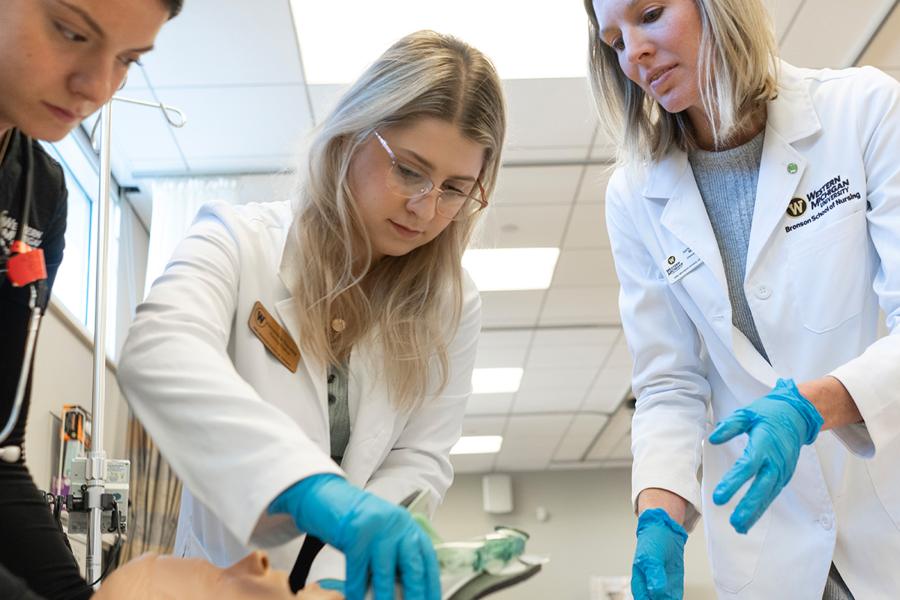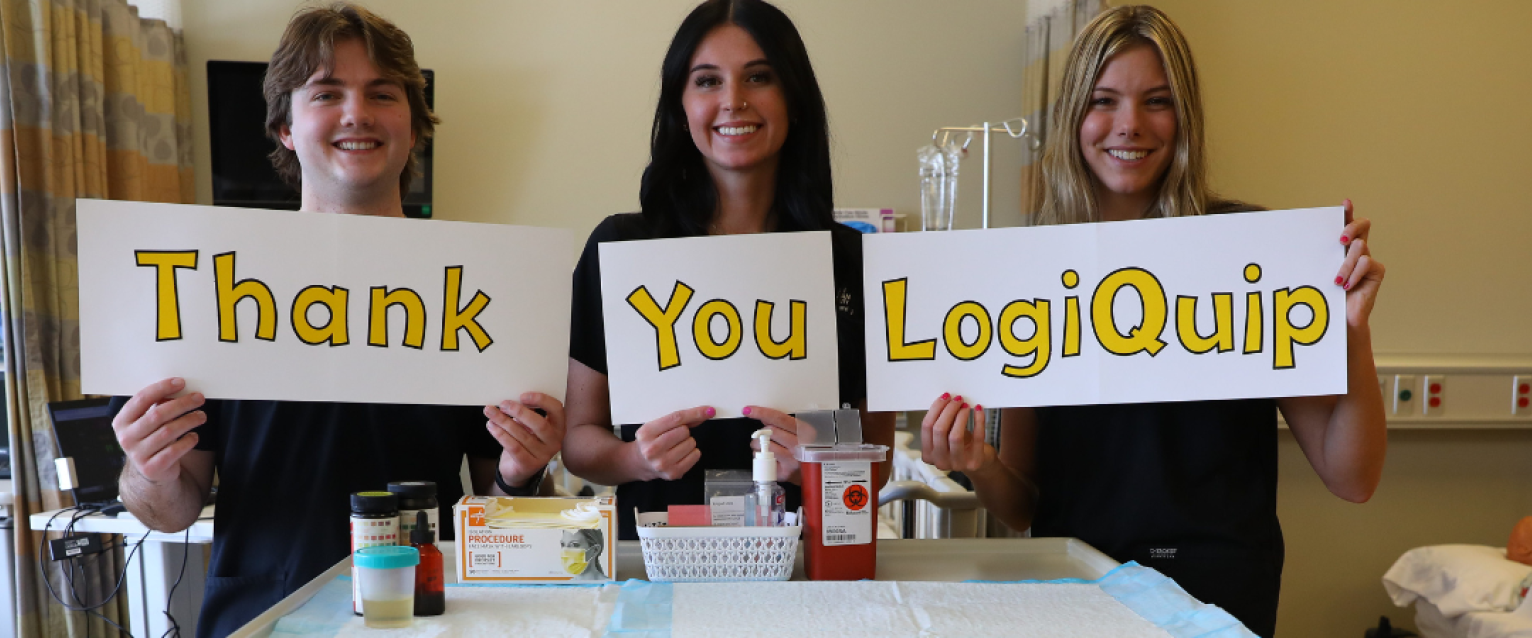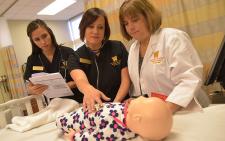Pursue a pre-licensure Bachelor of Science in Nursing
The WMU Bronson School of Nursing offers a four-year, 122-credit pre-licensure Bachelor of
Science in Nursing (BSN) that prepares students for diverse roles in healthcare. The program emphasizes evidence-based practice, leadership and interprofessional collaboration, while fostering critical thinking and compassionate care. Students benefit from a rigorous academic environment and hands-on clinical experiences that reflect the highest standards of nursing education. The Bronson School of Nursing's holistic endorsement ensures that students are supported as whole individuals—academically, emotionally and socially—through inclusive, student-centered learning. Graduates are eligible to take the NCLEX-RN and are well-prepared for leadership roles or advanced nursing degrees.
Technical Standards: Please consult the Bronson School of Nursing Student Handbook for descriptions and examples of technical standards to inform prospective and enrolled students of a sampling of technical standards required in completing their nursing science curriculum.
If you are a registered nurse interested in pursuing your BSN, learn more about our RN-BSN program.
Admissions
The Bronson School of Nursing (BSON) is committed to building and sustaining a diverse academic community of faculty, staff and students. We have developed a holistic admissions process that allows us to admit students with unique experiences and excellent academic performance to come together in an inclusive learning environment.
The admissions process is competitive, thorough and includes a critical evaluation of your:
- GPA (may include a personal statement)
- Letter of recommendation
- Essay questions
- Interviews. This allows you to share the experiences you feel support your admission to the nursing program.
There are two admission options to a pre-licensure BSN degree at WMU:
Direct admission from high school
This admissions option is for graduating high school students. There are academic requirements to qualify for this pathway and to remain in the pathway as a student.
High school students, if you apply to WMU by the Early Action Deadline (Dec. 15), declare your major as "nursing," and meet certain criteria (see below), you will be considered for direct admission to the BSN program.
If you are accepted as a direct admit student, you must maintain academic minimums to remain in the direct admission pathway.
Selection criteria:
- High school GPA of at least 3.6 or higher.
- Composite SAT score at or above 1240 or equivalent ACT score (optional).
- At least one year of high school chemistry - grades will be evaluated.
- Meets math placement requirements (ACT Math 27 OR SAT Mathematics 640 OR ALEKS placement assessment of 61) to enroll in WMU CHEM 1510/1520 Chemistry for Health Professionals.
- At least two years of high school biology - grades will be evaluated.
Once admitted:
- Maintain a minimum 3.25 cumulative GPA (This requirement changes for fall 2026 direct admit students, who need to maintain a minimum 3.5 cumulative GPA for a fall 2027 nursing program admission).
- Earn a B or better in each of the prerequisite sciences courses (CHEM 1510 and 1520, CHEM 1530, 1540 and BIOS 1910, 2400).
- Earn no less than a C in all other courses.
- Complete all prerequisite (qualifying) courses within three (3) semesters*.
If you fail to maintain these standards, you will be removed from the direct admission pathway. In that case, you can re-apply to the BSN program as part of the competitive application.
* those who choose to complete the qualifying courses in 3 semesters may graduate in 4.5 years

Competitive admission
This option is for current WMU students and incoming transfer students. Transfer students must be admitted to WMU (apply to WMU).
The pre-licensure BSN program at WMU is one of the University's most competitive programs, which means that there are more qualified applicants than there are seats in the program. We require students to complete prerequisite (qualifying) courses to provide a foundation for success in the pre-licensure BSN program.
Note: You can apply to the pre-licensure BSN program in the same semester you will complete the prerequisite (qualifying) courses.
Competitive admission is the most common path to enter the BSN program. Most students complete a year of prerequisite (qualifying) courses at WMU and then apply to the BSN program.
Note: Transfer students who have completed their prerequisite (qualifying) courses at another institution, must be accepted to WMU before applying to the nursing program. (Apply to WMU).
- Applications for the fall semester are due by March 15.
- Applications for spring semester are due October 15.
Our nursing program is built on a holistically integrated curriculum that sets us apart from other institutions. Because of this unique approach, we do not grant credit for nursing courses completed at other institutions.
Step 1: Complete the pre-nursing prerequisite courses
The prerequisite (qualifying) courses are listed below. Transfer students, you may have completed equivalent courses at your previous institution. Meet with a CHHS advisor to verify your credits.
- Have an overall GPA of at least 3.0 (B)
- All individual course grades with a minimum grade of C (2.0) or above.
- Prerequisite (qualifying) course grades (or equivalencies) average a GPA of 3.0 (B).
- Earn an average grade of B (3.0) or above in the four science prerequisite courses (or equivalencies)
- Each prerequisite (qualifying)course may only be repeated once. Only the second grade will be considered in the admission decision.
Step 2: Complete the application
You can apply to the BSN program in the same semester when you will complete the prerequisite (qualifying) courses.
| This instructional video shows how to self-enroll and provides an overview of completing the application documents and requirements. | Click this application link to access the self‑registration page in eLearning and follow the on‑screen directions to apply to the nursing program. |
Step 3: Complete the curriculum
Once you have been admitted to the WMU BSN program, you will complete the pre-licensure BSN curriculum.
Curriculum for students beginning in the program after fall 2025
Prerequisite (qualifying) curriculum
Courses taken during your first year.
Pre-licensure BSN program curriculum
Courses taken once admitted to the pre-licensure BSN program.
Total program credits: 122
Western Essential Studies and elective courses will be included in degree planning in consultation with your academic advisor.
* course includes an additional enrollment fee.






